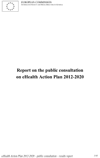
- Objective 1: Increase awareness of the benefits and opportunities of eHealth, and empower citizens, patients and healthcare professionals.
- Objective 2: Address issues currently impeding eHealth interoperability
- Objective 3: Improve legal certainty for eHealth
- Objective 4: Support research and innovation in eHealth and development of a competitive European market.
239 participants contributed to the consultation representing different stakeholders including non-governmental organisations, academia, enterprises, health and social care providers and public authorities from many Member States.
Download Report on the Public Consultation on eHealth Action Plan 2012-2020 (.pdf, 202 KB).
Download from eHealthNews.eu Portal's mirror: Report on the Public Consultation on eHealth Action Plan 2012-2020 (.pdf, 202 KB).